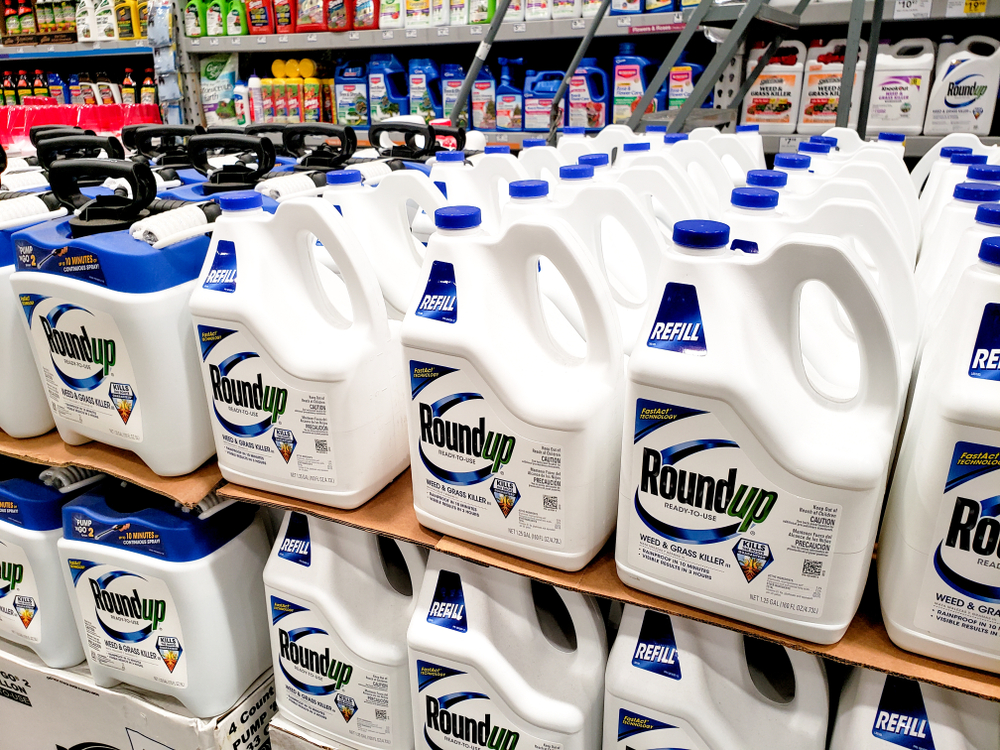A Philadelphia court ruling earlier this month marks the fifth consecutive trial loss for pharmaceutical giant Bayer, whose Roundup weedkiller was named responsible for a Pennsylvania woman’s non-Hodgkin lymphoma.
Plaintiff Kelly Martel was awarded nearly $3.5 million in damages, a much smaller amount than other recent Bayer losses. In November, just three plaintiffs won $1.56 billion.
Although amounts that high could be reduced because they exceed U.S. Supreme Court guidance, the verdicts represent a significant turn of fortune for Roundup users, hundreds of thousands of whom have sued Bayer for exposure to glyphosate, the weedkiller’s main ingredient. They say the herbicide gave them cancer, most notably non-Hodgkin lymphoma.
Bayer won nine cases before their streak was broken in October with three losses in three states totaling more than $500 million.
Martel’s lawsuit was actually against Nouryon Chemicals, its various subsidiaries, and Monsanto, not Bayer itself. Her lawyers contended that Nouryon created a chemical compound that enhanced Roundup’s cancer-causing properties.
In a 10-2 split, the jury found Monsanto 92.5 percent liable for her injuries and Nouryon just 7.5 percent.
“We disagree with the jury’s divided verdict and the modest damages award that conflicts with the overwhelming weight of scientific evidence and worldwide regulatory and scientific assessments, and believe that we have strong arguments on appeal to get this verdict overturned,” said Chris Loder, Bayer’s Head of External Relations.
The Environmental Protection Agency (EPA) maintains that glyphosate is safe when used correctly, and in November, the European Union renewed its use for another ten years.
The World Health Organization (WHO) classified glyphosate as a probable carcinogen in 2015. Although they were later found to have edited out evidence contradicting those results, independent research has reached similar conclusions. One 2019 study suggested that glyphosate exposure increases cancer risk by 41 percent.
A new scientific paper published earlier this month found that pregnant women living near farm fields show “significantly” increased amounts of glyphosate in their urine while farmers are spraying the fields. The participants did not work with glyphosate; they only lived near farms that used it.
These findings echo other recent research showing that gestational exposure to glyphosate is associated with reduced fetal growth and other in-utero problems.
Bayer acquired Roundup in 2018 after purchasing Monsanto for $63 billion, to the vehement protest of some shareholders.
Those shareholders are now putting pressure on Bayer to end the litigation, which company officials hoped might be possible during their nine-case winning streak.
Bayer is currently facing about 50,000 Roundup lawsuits, even after agreeing in 2020 to pay nearly $10 billion to settle nearly 125,000 then-existing claims.
Roundup lawsuits allege that the ingredients in the herbicide are harmful to human health and that Monsanto and Bayer either knew of these dangers and kept that knowledge from consumers or performed inadequate safety tests before releasing the product.
A change in plaintiffs’ strategy could explain the shift in victories, as recent judges have allowed jurors to hear testimony not utilized in previous trials that Bayer calls improper evidence.
“Plaintiffs are on a winning streak,” Nora Freeman Engstrom, a Stanford Law professor who studies mass tort actions, told the New York Times. She said the recent verdicts don’t bode well for Bayer because plaintiffs’ lawyers can use statements from prior testimony to build a stronger case over time.
“With each trial, the playing field shifts subtly toward plaintiffs.”
For example, jurors learned of a federal appeals court’s 2022 ruling that the EPA must reconsider its 2020 decision on glyphosate’s safety. Plaintiffs’ lawyers, as in Martel’s case, have also been focusing more on the theory that other ingredients in Roundup (e.g., known toxins like arsenic and formaldehyde) increase its carcinogenic potential.
At least a dozen more Roundup trials are expected in 2024; Bayer has attempted to placate shareholders by pledging another $6.5 billion in reserved funds to settle those cases.
But since the merger of Bayer and Monsanto was announced – even before Roundup litigation began – Bayer’s shares have fallen more than 60 percent. The company’s market capitalization is now worth approximately $33 billion, less than half of what it paid for Monsanto.
Roundup has been the world’s most popular herbicide since Monsanto began selling it in 1974.
Bayer has maintained that Roundup is safe and says it will continue to fight recent verdicts. The company has unsuccessfully attempted to end Roundup litigation via a Supreme Court ruling and Congressional bill.
Bayer stopped selling Roundup for residential use in January 2023; it remains available for commercial and agricultural use.
Roundup users who have developed cancer and believe it may be due to glyphosate exposure should contact an experienced Roundup lawyer to assess their eligibility for a claim.










